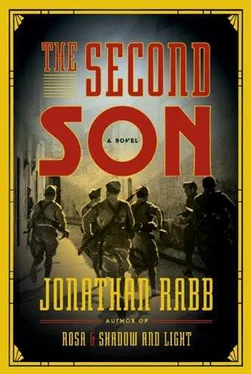Jonathan Rabb - The Second Son
Здесь есть возможность читать онлайн «Jonathan Rabb - The Second Son» весь текст электронной книги совершенно бесплатно (целиком полную версию без сокращений). В некоторых случаях можно слушать аудио, скачать через торрент в формате fb2 и присутствует краткое содержание. Жанр: Политический детектив, на английском языке. Описание произведения, (предисловие) а так же отзывы посетителей доступны на портале библиотеки ЛибКат.
- Название:The Second Son
- Автор:
- Жанр:
- Год:неизвестен
- ISBN:нет данных
- Рейтинг книги:4 / 5. Голосов: 1
-
Избранное:Добавить в избранное
- Отзывы:
-
Ваша оценка:
- 80
- 1
- 2
- 3
- 4
- 5
The Second Son: краткое содержание, описание и аннотация
Предлагаем к чтению аннотацию, описание, краткое содержание или предисловие (зависит от того, что написал сам автор книги «The Second Son»). Если вы не нашли необходимую информацию о книге — напишите в комментариях, мы постараемся отыскать её.
The Second Son — читать онлайн бесплатно полную книгу (весь текст) целиком
Ниже представлен текст книги, разбитый по страницам. Система сохранения места последней прочитанной страницы, позволяет с удобством читать онлайн бесплатно книгу «The Second Son», без необходимости каждый раз заново искать на чём Вы остановились. Поставьте закладку, и сможете в любой момент перейти на страницу, на которой закончили чтение.
Интервал:
Закладка:
“No,” said Hoffner. “I’m sure not.”
“And the woman?”
Hoffner pulled out his cigarettes. This time he offered one to Doval. “The woman is no concern of yours.” Doval took one and Hoffner lit it. “She has a brother who fights for you. That should be enough.” He lit his own and sat back. “When was Bernhardt here?”
Doval was doing what he could to reassert control. He sat back as he stared across through the smoke. “He wasn’t,” he said.
Hoffner knew to tread carefully. Any moment this could all come crashing down. He began to feel a dull throbbing at the back of his neck. He took another careless pull on the cigarette and said, “Really?”
“But I would have assumed you knew that.”
Doval was proving surprisingly adept. Hoffner let the smoke trail from his nose. “Would you?” he said. His only choice was a quiet contempt. “And when would I have learned this, Captain, having been in Barcelona for the past four days? When I telephoned to Berlin from the Ritz? I’m sure no one at the anarchist telephone exchange would have thought to ask why.” And with no time for a response, “I need to know when Bernhardt was here. Do we understand each other?”
Doval might not have found the sweating German-with his half stories and vague papers-compelling, but Hoffner had brought something else with him: the aura of Nazi infallibility. It was enough to cut through any lingering concern.
“It was the nephew,” said Doval. “The boy from Barcelona. No doubt you’ve met him.”
Nephew, thought Hoffner. The drug addict was a nephew. Which meant there was a second, older Bernhardt. Hoffner had spent a career being told things he was meant to know. It made revelations like this quickly digestible.
Hoffner said, “I don’t trust anyone involved with that. Opium is a mind without control, too easily persuaded. When was he here?”
Doval flicked a bit of ash into the ashtray. “Six days ago. He said he was having trouble establishing contacts.”
“The Chinese were being less than accommodating?” Hoffner let this settle for only a moment. “As I said, I don’t trust any of it. I haven’t from the start.” Hoffner finally saw what he had been hoping for: an instant of mutual understanding. They would find common ground in their distaste for the drug lines. Hoffner said, “Bernhardt thinks he’s helping the nephew. I’m here to make sure he understands that’s no longer in his best interests. Where was the nephew heading?”
“South.”
“And the elder Bernhardt knew this?”
“I assume so.”
Hoffner decided to take a chance. “You assume so? You have wires to this effect?”
It was not a good choice as Doval looked momentarily puzzled. “I don’t think I follow.”
The throbbing became a dull ache. Hoffner retreated to frustration. “The elder Bernhardt. Did he communicate this to you?”
Doval was no less forthright. “He made it clear we were no longer to continue in this direction.”
“With the Chinese and the drugs?”
“Yes.”
“And the nephew knew this?”
“Yes.”
“He knew the guns were still coming from the south?”
Doval’s hesitation returned. The SS never asked; they gave orders. This was too many questions. Regardless, Hoffner had swum well beyond his limits; there was no point in worrying about getting back to shore now.
“The elder Bernhardt,” Hoffner pressed. “He made it clear that the drug lines were no longer a possibility, that the new routes were to go through Teruel.”
Doval showed a moment’s pause. This had struck a nerve.
Hoffner said, “I’ve said something that confuses you, Captain?”
Doval kept his eyes fixed on Hoffner. “No, Hauptsturmfuhrer, you haven’t.”
The answer was too weak, and with nothing behind it. “You’re aware of Teruel, Captain?”
“Yes,” said Doval. “Of course.”
“You’re not filling me with tremendous confidence. I need to see these wires.”
“You continue to refer to routes, Hauptsturmfuhrer.” Doval spoke with an unexpected resolve. “What routes would those be?”
The gaze across the desk showed none of the weakness of only moments ago. Mila had been right. These were not men to be underestimated. Hoffner wondered if this was where Doval had been leading him all along.
Hoffner waited. He took another pull on his cigarette. He let the smoke spear through his nostrils. And then he did what any good Nazi would do. He smiled.
“You don’t speak German,” said Hoffner. His voice carried a newfound respect. “Now I see why.” He leaned forward and slowly crushed out his cigarette. “Ambition is a far more vital quality.”
Doval showed nothing, and Hoffner knew it was only a matter of time before there would be a second telephone call to Berlin.
Hoffner continued. “Bernhardt chose not to tell you about the routes, Captain. I have to accept that. My mistake was assuming you knew, Teruel notwithstanding. If that means you take me outside and shoot me, so be it.”
Doval sat remarkably still. Hoffner returned the gaze and understood the reason Gabriel and his kind had taken no time for celebrations: if this was Spain’s future, there would be no Spain worth remembering.
Doval said, “I wouldn’t bother taking you outside, Hauptsturmfuhrer. The walls in my office are sturdy enough.”
Hoffner gave in to another smile, and Doval opened the top drawer of his desk. He reached in and pulled out a thin file of papers. He handed them across and sat back while Hoffner read.
The air outside was remarkably fresh. Or perhaps it was just that Hoffner felt himself breathing again for the first time in the last hour. The young lieutenant assigned to escort him to the cafe walked with no such appreciation for the air.
Hoffner said, “Your German was excellent on the telephone.”
The young lieutenant nodded once. He spoke again in German. “Thank you, Hauptsturmfuhrer.”
“In the coming weeks, Captain Doval will need you more than he knows.”
“Yes, Hauptsturmfuhrer.”
Hoffner found himself lighting a cigarette as he walked.
He suspected Doval might be telephoning to Berlin at this moment, perhaps even to Langenheim. That said, there was very little in the wires to concern Doval-at least in showing them to someone who had mentioned routes and guns and Teruel.
As far as Hoffner could tell, the wires served as confirmation: the nephew had been in Barcelona; he had come to Zaragoza; he had gone on to Teruel. After that, he was due to head west, stopping along the way in places now, or soon to be (God willing), in fascist control: Cuenca, Tarancon, Toledo, Coria, and finally Badajoz on the Portuguese border; a straight line across the heart of Spain.
More than that, there were contact names in each of the towns and cities, along with addresses for each man. Hoffner had written them all down.
The travel itinerary was the elder Bernhardt’s way of assuring Captain Doval and his fellow liaisons across the country that mechanisms were being set in place to guarantee the steady flow of guns and ammunition from Germany into Spain. How they hoped to accomplish that-and how these contact names played a role-remained the mystery.
Hoffner was guessing Georg might be trying to piece that together himself.
“Here we are,” the young lieutenant said.
Hoffner tossed his cigarette to the ground and followed the boy to the cafe door.
The Gran Cafe was wall-front windows and wooden pillars throughout, with the smell of fresh coffee and garlic hanging in the air. Mila was at a table at the back, beyond the bar. A man in the uniform of a requete sat with her. He was reading through a letter.
Читать дальшеИнтервал:
Закладка:
Похожие книги на «The Second Son»
Представляем Вашему вниманию похожие книги на «The Second Son» списком для выбора. Мы отобрали схожую по названию и смыслу литературу в надежде предоставить читателям больше вариантов отыскать новые, интересные, ещё непрочитанные произведения.
Обсуждение, отзывы о книге «The Second Son» и просто собственные мнения читателей. Оставьте ваши комментарии, напишите, что Вы думаете о произведении, его смысле или главных героях. Укажите что конкретно понравилось, а что нет, и почему Вы так считаете.












